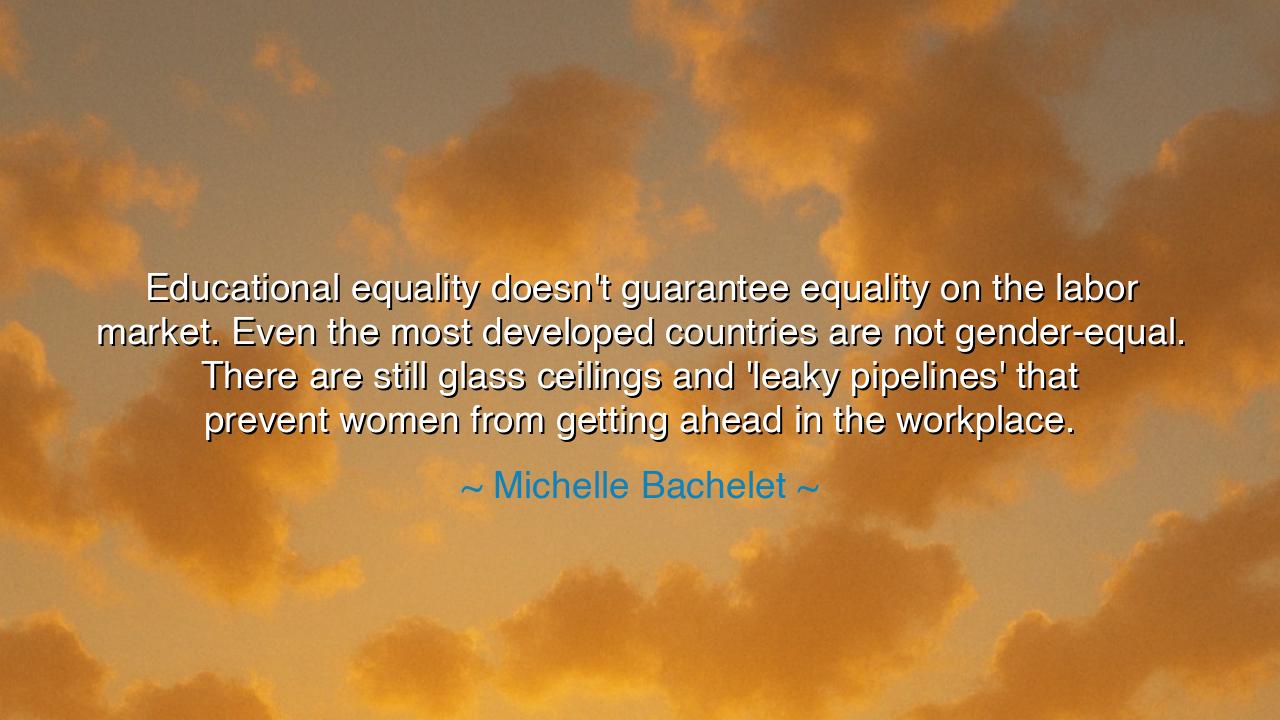
Educational equality doesn't guarantee equality on the labor
Educational equality doesn't guarantee equality on the labor market. Even the most developed countries are not gender-equal. There are still glass ceilings and 'leaky pipelines' that prevent women from getting ahead in the workplace.






When Michelle Bachelet proclaimed, “Educational equality doesn’t guarantee equality on the labor market. Even the most developed countries are not gender-equal. There are still glass ceilings and ‘leaky pipelines’ that prevent women from getting ahead in the workplace,” she spoke with the clarity of a leader who has walked through the fire of experience. Her words are both a recognition of progress and a lament for its incompleteness — a reminder that education alone does not dissolve injustice, and that equality on paper often hides inequality in practice. Bachelet, who rose from exile under dictatorship to become the first female President of Chile, understood deeply that empowerment must travel beyond classrooms and into boardrooms, laboratories, and parliaments.
The origin of this quote comes from Bachelet’s long advocacy for women’s rights, particularly during her role as the first Executive Director of UN Women, where she spoke frequently about global gender disparities. She observed that, while access to education for women had greatly improved across much of the world, the fruits of learning were not equally rewarded. Women, though trained, skilled, and ambitious, still found their ascent blocked by invisible barriers — what she calls “glass ceilings” — and many quietly disappeared from professional pathways, the “leaky pipelines” that drain talent from the corridors of power. Her insight, born of both personal journey and public service, lays bare a truth that civilization must confront: equal opportunity must be matched by equal recognition.
In the style of the ancients, we may say that Bachelet’s words are an invocation to justice beyond illusion. For in every age, humanity has confused the granting of access with the granting of power. To allow women into schools but deny them influence is to educate them for disappointment, not dignity. Like the wise teachers of Athens who said that knowledge must be joined with virtue to bear fruit, Bachelet warns that education without transformation is a hollow victory. Society may boast of progress, but as long as its workplaces still prize conformity over fairness, the promise of equality remains unfulfilled.
Consider the story of Rosalind Franklin, the brilliant chemist whose x-ray diffraction work was pivotal in discovering the structure of DNA. Her research was used without proper credit; her male counterparts, Watson and Crick, received the Nobel Prize that her findings made possible. Franklin’s life is a symbol of the “glass ceiling” that Bachelet describes — an invisible boundary that allows women to approach greatness but not to be recognized as its authors. In every century, such stories multiply: women who teach others to fly but are denied wings themselves.
Bachelet’s metaphor of the “leaky pipeline” speaks of a quieter tragedy — the slow erosion of women’s participation as they face discrimination, lack of support, or impossible burdens of care. Many leave not because they lack ability, but because the structures around them are built for others to succeed. A society that fails to retain its talent, she suggests, impoverishes itself. The loss of one woman’s voice in leadership, one scientist in the lab, one entrepreneur in the market, is not merely her loss — it is a wound in the collective progress of humanity.
Her words also challenge complacency in so-called “developed nations.” Even in lands that pride themselves on progress, women are still underpaid, underrepresented, and undervalued. Thus, Bachelet’s message is both global and eternal: no nation is truly free until its daughters can rise without obstruction. The struggle for gender equality is not a matter of charity or symbolism, but of justice and survival — for only when every citizen’s potential is fully realized does a society reach its true strength.
Let this be the lesson passed to future generations: education is the seed, but equality is the harvest. To honor Bachelet’s words is to labor not only for learning but for liberation — to build systems where skill and merit triumph over prejudice and inertia. Let every leader, teacher, and parent remember that a world which teaches girls to dream must also make room for them to lead. For as the ancients taught, wisdom that is not enacted is folly, and knowledge that does not lift the oppressed is wasted light. Let us, then, clear the glass ceilings, mend the leaky pipes, and ensure that equality is not a promise deferred, but a destiny fulfilled.






AAdministratorAdministrator
Welcome, honored guests. Please leave a comment, we will respond soon